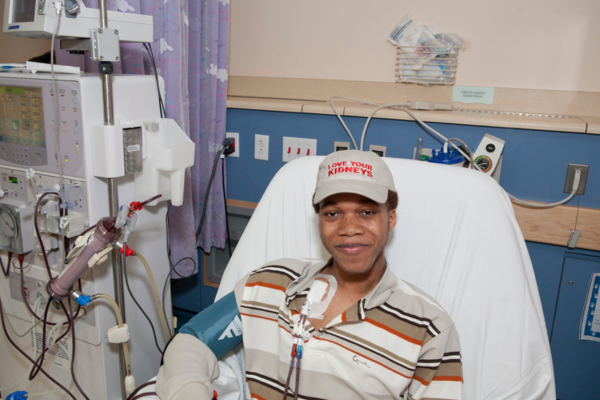May 23, 2023
Kimberly was diagnosed with kidney disease in 2013 but stayed off dialysis until 2017 by following her doctor's recommendations. When she did start dialysis, she found the transition challenging–then, she lost her mother, father, and husband in quick succession. These sudden changes were crushing but Kimberly was determined to pick up the pieces. How did she do it? Laughing.
Kimberly's kidney disease journey
The first dialysis treatment for many people is hard, but for Kimberly, the dialysis center staff’s treatment of her emotions made it even worse.
"In 2017, before I lost so much of my family, I had my first dialysis treatment and cried. The tech came over to say, 'You can't cry here. You can't be a baby.' That made me cry more. It was miserable," said Kimberly. "I received my treatment during the first shift on Tuesdays, Thursdays, and Saturdays. My husband didn't drive, so we were scrambling to get myself to treatment and him to work while caring for my mom, who had Alzheimer's."
After three months, Kimberly moved to a different clinic but was placed on the second shift, making it incredibly difficult to care for her mom. Get caregiving resources.
"I finally got the first shift on Monday, Wednesday, Friday. On my first early shift, one of the ladies asked how I was. I'd never talked to anyone in the dialysis center before. She introduced me to some other patients and we started talking," Kimberly said. "We have always had the best conversations that continue to this day. We do nothing but laugh and it's fantastic. I don’t dread it anymore since I have my dialysis family there."
Then tragedy struck.
"My dad had a hemorrhagic stroke in 2019. So I was taking care of him, my mother, and a pug named Porky who had diabetes. Porky passed away in early 2020, then my father in April, and my mother in July," said Kimberly. "My husband helped me through it by getting me involved as a patient representative at my dialysis center. Then I suddenly lost him in January 2022."
After so much loss, it would have been easy for Kimberly to give up but laughing with her dialysis group helped her cope.
"I have family but they live far away so the only people I see consistently are at the dialysis center. I can't give up because I know they rely on me," Kimberly said. "I don't want anyone to go through what I went through at that first center so I always introduce myself and offer help to new patients."
Kimberly didn't know it, but laughing may have improved her mood and health!
Here's how to find the right dialysis center for you.
What is laughter therapy?

Laughing therapy is a type of exercise, sometimes called laughter yoga, that incorporates stretching, arm and leg movements, and (of course) laughter. Learn more about the benefits of exercise.
But how do you stimulate laughter in a dialysis center? Are comedians coming in? Not quite.
"We start with stretches and then go, 'Oh, ho, ho! Ha, ha, ha! Ho, ho, ho!' Although your brain knows that you're forcing this laughter, it becomes natural over time. Soon you're laughing and then the person next to you is too. You do that for 30 minutes and then cool down. At the end, you're exhausted because it's physical activity," said Doctor Paul Bennet, professor of kidney nursing at Griffith University in Australia. "Laughter is a full body workout–that's why your stomach hurts after laughing really hard. This practice can induce happy hormones like dopamine, endorphins, oxytocin, and serotonin that improve your mood."
Through large-scale clinical trials1, Dr. Bennet found that the groups who attended laughter therapy in dialysis felt better and had fewer signs of depression than the group who didn't
participate in laughter therapy. They also found a few unexpected bonuses.
"Because you're doing a physical workout, your blood pressure goes up in the moment, but down in the long term," said Dr. Bennet. "Many people on dialysis have hypertension (high blood pressure), but laughter therapy decreased that number. The incidence of hypotension (blood pressure dropping quickly during dialysis treatments) also fell."
While laughing therapy has yielded excellent results, it may not be for everyone.
"We found that a quarter of people didn't like it and that's okay. Some people keep to themselves and cope with dialysis differently. They told us they don't like forcing themselves to laugh but love hearing other people enjoy it. You're also not going to do laughter all of the time–it's just one tool like meditation, breathing, or physical activity," Dr. Bennet said.
For Kimberly, laughter came to her when she most needed it.
"Having that connection and knowing that you touched that person's life, means a lot. We had an old guy tell our social worker that the only reason he came to dialysis is knowing he'd get a big hug from me every time he came in and left," said Kimberly. "He passed away but knowing that I was the reason why he came is a fabulous feeling. It's heartwarming. If you can make someone in dialysis smile, it's a good day and a good treatment."
Join a community that understands what you're going through.
Are you looking for more support?
You don't have to navigate the challenges of kidney disease alone. NKF Peers is here to offer you a helping hand. We can connect you with a fellow kidney warrior who's been there, ready to share their wisdom about dialysis, transplant, or the incredible gift of a living kidney donation.
Reach out and connect with someone who truly gets it.
Looking for the latest in kidney research, care, and treatment?
Subscribe to Hot Topics in Kidney Health, the podcast that examines important kidney topics, brings in the experts, and provides actionable tips that you can start using today.
Source
1Bennett, Paul N., et al. “The Effects of Laughter Therapy on Depression Symptoms in Patients Undergoing Center Hemodialysis: A Pragmatic Randomized Controlled Trial.” Hemodialysis International, vol. 24, no. 4, 2020, pp. 541–549., https://doi.org/10.1111/hdi.12870.






